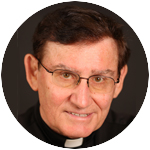Thanks to the Pontifical Biblical Institute, not far from Rome’s Victor Emmanuel II Monument, the world is better able to enjoy and understand the Scriptures.
Recently, I enjoyed a visit to it. In 1909, Pope Pius X established it, and in 1927, it opened a branch in Jerusalem.
Both consist of scholars from around the world who, among other things, make their life’s work studying languages, various interpretations and archaeological ruins that better reflect the times in which the Scriptures were written and God’s intention for our creation.
To my surprise, a lecture I attended on the Pharisees painted them much differently from being “evil” adversaries of Christ. Rather they were protectors of Hebrew customs that kept Israel unified by such things as the law of circumcision and prohibited foods.
[hotblock]
What struck me most was the driving spirit of delving deeply into the word of God. So often, we hear passages from Scripture but never deeply probe their depths. Most often, we look for answers addressing our personal life. Yet Scripture prompts us to go beyond self-concerns and to see ourselves as part of universal history. We are to consider ourselves a part of history; making God’s kingdom known is our earthly mission.
Pope Francis often speaks of our universal connectedness, reminding us to go beyond our little world and to connect with its bigger picture.
The Canticle of Daniel implores us to raise our eyes to the heavens, to look outward and to bless God for the moon, sun and seasons that nourish us through their cycles.
Christ is forever beseeching us to serve and reach out to the poor and share our blessings with them.
Among other things, I received a new insight from my visit to the institute on how strongly the Scriptures laud altruism and selflessness.
Experiencing the environment at the institute reminded me that Scriptures hold infinite insights into God’s desire for us — to be imaginative and creative in understanding them and to know that you are never too old to go back to school and increase your knowledge of them.
PREVIOUS: Unalienable rights still exist, and must be protected
NEXT: As ‘nones’ flee religion, what’s a parent to do?



Share this story